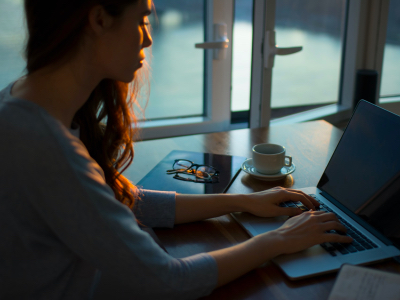 As lockdown is lifted, companies are starting their return to the workplace.
As lockdown is lifted, companies are starting their return to the workplace.
For many people, the most recent lockdown was the toughest, with a YouGov poll of over 1,000 UK workers finding that 44% of workers felt their mental health was worse now than last spring. Just 15% said their mental health was better.
Dee Johnson, psychotherapist at The Priory Hospital Chelmsford, says that for some, their lives have irrevocably changed: “Are people returning to work thinking they may have Long Covid, and struggling? Absolutely – first job insecurity is understandably rife and not an irrational fear for many, so wanting to get back, and prove your worth and value, is a real driver to ignore health – we all have a survival response and this fear-driven trigger is going to be quite common. For others the effects of isolation and detachment have been so severe that taking a risk to come to work will seem worth it, just to get connections and a change of environment and their old life back.
“From ongoing health anxieties, and hypervigilance to ailments people may experience, to health checking all the time – I am also seeing quite a bit of obsessional SP02 blood oxygen level checking on smart devices.”
She adds: “We cannot underestimate what a highly emotive time this new phase of the pandemic will be for so many. Some colleagues – who may not have seen their co-workers in person for well over a year – will have experienced bereavements, relationship breakdowns as well as isolation and loneliness, since they were last in the office.
“And so many questions are starting to arise. Am I safe from the virus? How will we cope if a co-worker is not respecting the Covid health and safety measures? Will my workspace look and feel completely different with Covid restrictions?
“These are all natural concerns – and ones which employers will have to be prepared for. Moreover, bosses need to have an ‘open door’ policy and encourage their teams to come forward with their worries.
“Depression and general anxiety is prevalent among those who have had Covid – for some there is anger towards others who they see as not following protocol and possibly spreading the virus, and putting them at risk. With any sense of loss, which Covid brings, losing health and certain abilities leads to an increase in unhelpful ‘self-medicating’ strategies such as emotional eating, and an increase in alcohol consumption.”
Rewrite your narrative
Dee Johnson advises that support must be in place for employees struggling with their mental and physical health.
For those employees who are worrying about getting back to the office, she advises, “Do not expect to feel the same; setting the alarm, dressing for work and going back to old routines may feel alien, overwhelming or even annoying. That is completely understandable – being in isolation reshapes us quite quickly. As a survival response, we adapt to our environment, so returning to a previous way of life may not be the smooth transition assumed.
“One coping mechanism is to write down what your concerns are and then at the end of each day, if none happened, cross them out. If it did happen, then process how you managed it, what you could do differently and think about who else might have been struggling. By this simple process of evaluation, you will learn to trust, cope and realise that most things are not insurmountable.
Give yourself time
“Do not put pressure on yourself or others to expect things to continue as they were. You will evolve back into things eventually but this can take some time.
“Sharing how you feel can really help – not getting stuck with your ‘what if’ thoughts in your head is really important.
“Many people will have been very isolated during the pandemic with little or no actual interactions with others and this may have been incredibly challenging. The months you spent adapting to isolation can really knock your confidence in both self and social skills – and when low self-esteem kicks in, so does self-doubt and over-thinking, seeing everything with a negative, fear-based slant.
“It’s also important to recognise that you do have the right to have changed your perspective and values and may not want to go back to some of that ‘old stuff’ that you may have felt duty bound by, yet, on reflection, never actually served you well.”
Employers need to help, too
Dr Niall Campbell, consultant psychiatrist at Priory’s Roehampton Hospital in south-west London, says employers must support their workforce, “Employers should arrange mental health training for managers, have mental health champions and promote well-being support. Many employers will have seen the benefits of allowing employees to work remotely – in terms of loyalty, productivity and morale. Staff who are very anxious and cannot readjust to office life, even weeks in, must be supported.
“Flexible working is here to stay so this should remain on the table wherever possible. It is important to listen and fully consider employees’ concerns. The last thing management wants is for worker morale to plummet and to have to recruit and retrain.
He adds; “For employees, try to access a mental health champion, or network at work, or a counsellor if you can access one through work or maybe health insurance. If your work offers counselling, it can usually be found through an Employee Assistance Programme.
“At this time of immense change, self-care is vital – so mindfulness, breathing techniques, diet, exercise, avoidance of alcohol to self-medicate for stress. Some employees are switching to cycling to work where possible. There are some very useful self-help apps for anxiety and stress. You might want to take your own food and drink to work, to avoid queues. Keep all lines of communication open with your boss. If you are struggling, they should arrange a conversation as soon as possible and be as supportive as possible.”
Dee Johnson concludes; “We kept hearing the phrase during the height of the pandemic ‘we are all in this together’ – this would be great if this was recognised for the workplace too. Now is the time to make positive changes and not slip back into unhealthy old ways. If you want a thriving workplace, ensuring there is a focus on mental and physical health is paramount.”
About Priory Group
The Priory Group is the leading provider of behavioural care in the UK, caring for around 30,000 people a year for conditions including depression, anxiety, drugs and alcohol addiction, eating disorders and self-harming. The Group is organised into four divisions – healthcare, education and children’s services, adult care and the Middle East.
WeAreTheCity covers the latest female centric news stories from around the world, focusing on women in business, careers and current affairs. You can find all the latest gender news here.
Don’t forget, you can also follow us via our social media channels for the latest up-to-date gender news. Click to follow us on Twitter, Facebook, Instagram, and YouTube.








